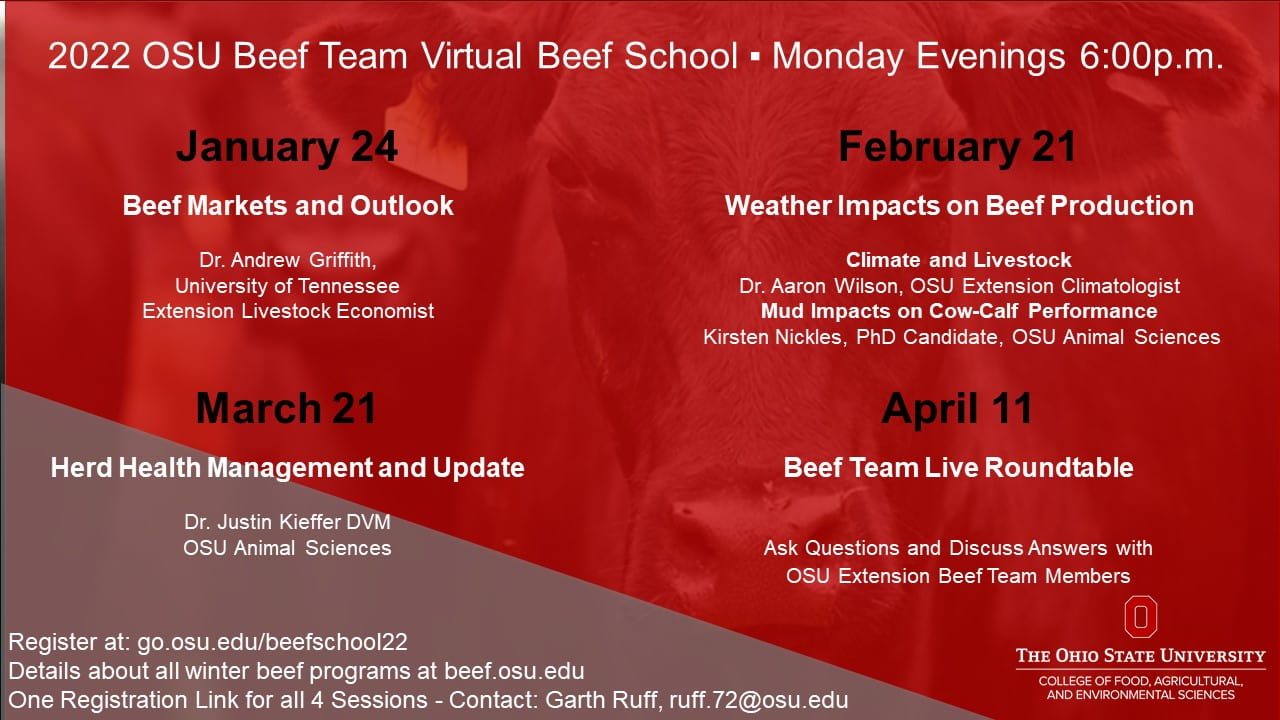 If you have an Ohio Pesticide or Fertilizer Applicators License it will expire on March 31, 2022. We will be holding the final opportunity for recertification in Northwest Ohio on March 24th at 5:ooPM. The event will be held in the Youth Activities Building on the Allen County Fairgrounds. The fertilizer session (Category 15) will run from 5-6pm followed by the pesticide portion (Categories 1,2,6 and Core) Please register today by calling us at (419) 879-9108 or by email at schroeder.307@osu.edu Registration cost is $10 for fertilizer recertification and $35 for pesticide recertification and includes educational materials and refreshments. The registration fee can be paid at the door with cash or check made out to OSU Extension – Allen County. This fee is separate from the Ohio Department of Agriculture license renewal fee of $30.
If you have an Ohio Pesticide or Fertilizer Applicators License it will expire on March 31, 2022. We will be holding the final opportunity for recertification in Northwest Ohio on March 24th at 5:ooPM. The event will be held in the Youth Activities Building on the Allen County Fairgrounds. The fertilizer session (Category 15) will run from 5-6pm followed by the pesticide portion (Categories 1,2,6 and Core) Please register today by calling us at (419) 879-9108 or by email at schroeder.307@osu.edu Registration cost is $10 for fertilizer recertification and $35 for pesticide recertification and includes educational materials and refreshments. The registration fee can be paid at the door with cash or check made out to OSU Extension – Allen County. This fee is separate from the Ohio Department of Agriculture license renewal fee of $30.
Month: March 2022
Beef Herd Health Management Update with Dr. Justin Kieffer
 Many health challenges on the farm can be avoided with proper herd health management, including vaccinations, treatment, and biosecurity. On Monday, March 21st Dr. Justin Kieffer, Clinical Veterinarian for the Department of Animal Sciences at OSU will be providing a Beef Herd Health Management update. Starting at 6:00 p.m. Dr. Kieffer will discuss vaccination protocols for both cows and calves, and how to best implement a vaccination program. Also, some emerging herd health issues including pink eye, anaplasmosis, and antimicrobial use will also be covered. If you have questions regarding cattle health, bring them with you to ask Dr. Kieffer after his presentation.
Many health challenges on the farm can be avoided with proper herd health management, including vaccinations, treatment, and biosecurity. On Monday, March 21st Dr. Justin Kieffer, Clinical Veterinarian for the Department of Animal Sciences at OSU will be providing a Beef Herd Health Management update. Starting at 6:00 p.m. Dr. Kieffer will discuss vaccination protocols for both cows and calves, and how to best implement a vaccination program. Also, some emerging herd health issues including pink eye, anaplasmosis, and antimicrobial use will also be covered. If you have questions regarding cattle health, bring them with you to ask Dr. Kieffer after his presentation.
If you’ve not yet registered for the 2022 Virtual Beef School sessions, go here now: http://go.osu.edu/beefschool22
Ohio Poultry Producers Encouraged to be Alert and Practice Enhanced Biosecurity

Courtesy of Ohio Department of Agriculture
High Path Avian Influenza (HPAI) has been confirmed in poultry flocks in Kentucky, Indiana, Virginia, New York, Maine, Michigan and Delaware. HPAI spreads quickly and can be fatal to flocks and devastating to poultry owners. ODA is urging poultry owners to intensify biosecurity and best management practices:
• Prevent Contact with wild birds and waterfowl. Keep birds indoors when possible. Add wildlife management practices around your farm. hpaifactsheet_wildlife-biosecurity.pdf (usda.gov)
• Keep visitors to a minimum. Only allow those who care for your poultry to have contact with them and make sure they follow biosecurity principles.
• Wash your hands before and after contact with live poultry. Use soap and water. If using a hand sanitizer, first remove manure, feathers, and other materials from your hands.
• Provide disposable boot covers (preferred) and/or disinfectant footbaths for anyone having contact with your flock. If using a footbath, remove all droppings, mud or debris from boots and shoes using a long-handled brush BEFORE stepping in. Always keep it clean.
• Establish a rodent and pest control program. Deliver, store, and maintain feed, ingredients, bedding and litter to limit exposure to and contamination from wild animals.
• Use drinking water sourced from a contained supply (well or municipal system). Do not use surface water for drinking or cleaning.
• Clean and disinfect tools and equipment before moving them to a new poultry facility. Trucks, tractors, tools and equipment should be cleaned and disinfected prior to exiting the property. Do not move or reuse anything that cannot be cleaned.
• Look for signs of illness. Monitor egg production and death loss, discoloration and/or swelling of legs, wattles and combs, labored breathing, reduced feed/water consumption.
• Report sick birds: Report unusual signs of disease or unexpected deaths to OPA (614) 882-6111 or ODA at (614) 728-6220 or afterhours at (888) 456-3405.
For more information on biosecurity practices, visit: USDA APHIS | Defend the Flock – Resource Center
Defend the Flock Winter Bulletin https://www.aphis.usda.gov/publications/animal_health/dtf-newsletter-winter-22.pdf
All cases in commercial and backyard flocks: USDA APHIS | 2022 Detections of Highly Pathogenic Avian Influenza